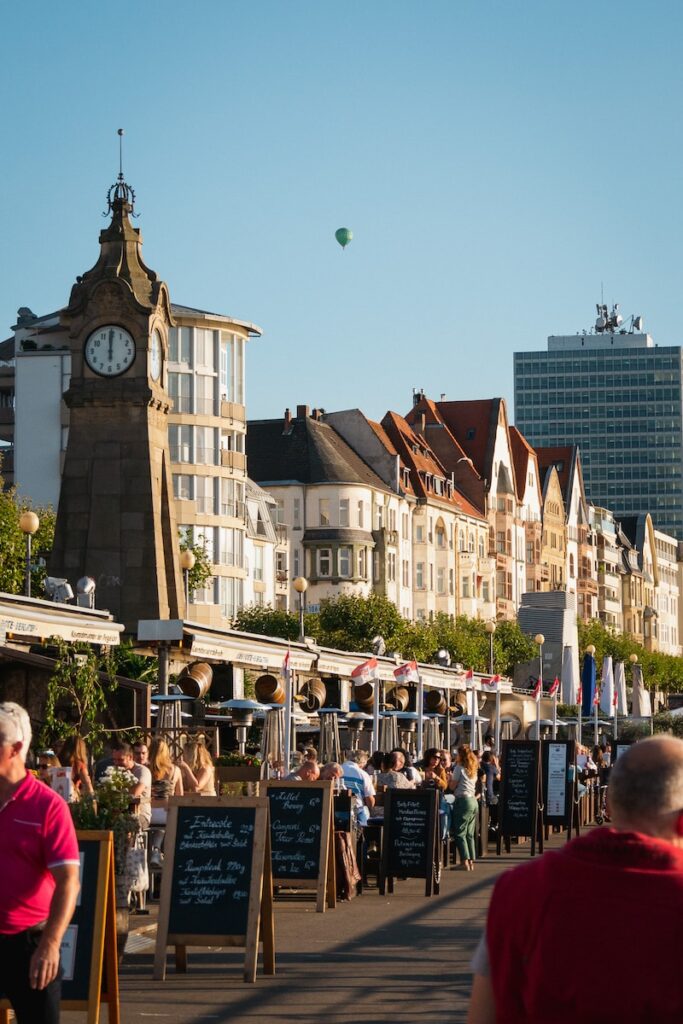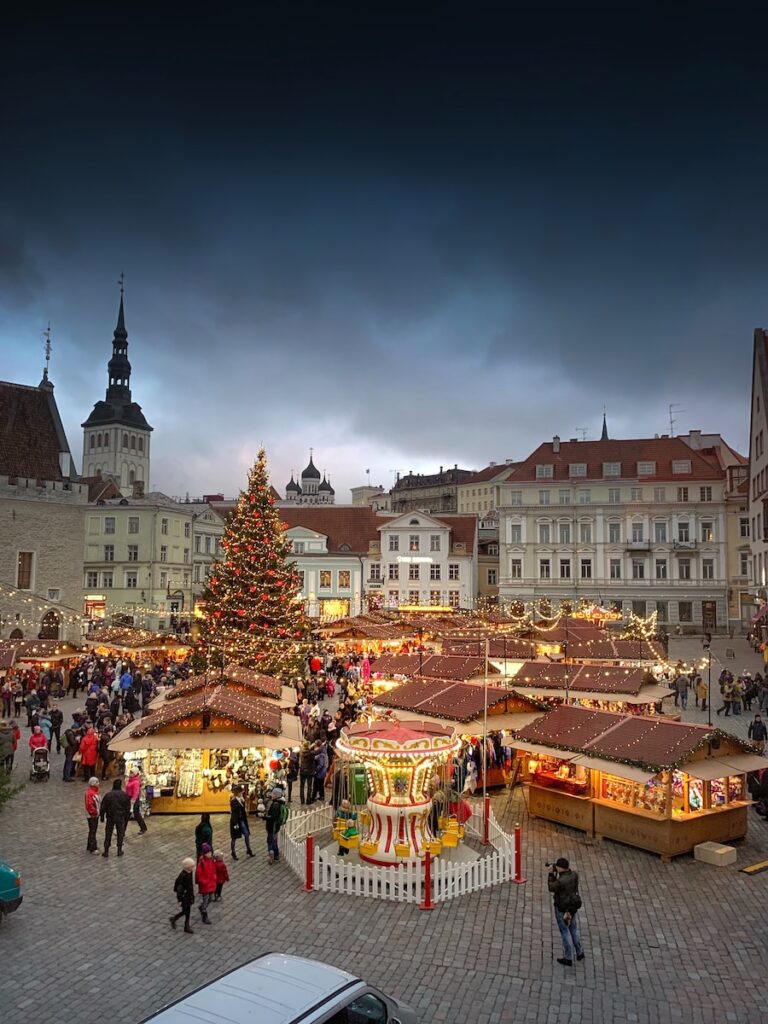Joining the Expats in Germany: Perks, Places, and Everything You Need to Know
Coming up in this guide: useful apps, Facebook groups, boring bureaucratic stuff, German lifehacks, references to cartoon owls, and everything you need to know about joining the expats in Germany.
Maybe you’re planning to move to Germany because of the good economy. Or the high wages. The job opportunities. The cultural diversity. The innovation. The blend of history and modernity. All the excellent outdoorsy stuff (and all the excellent outdoorsy infrastructure). Maybe it’s for all the edgy art and culture. Or maybe you just really really really like currywurst.
Whatever the reason, Germany is one the most appealing relocation hubs in Europe, and almost a quarter of the nation’s population is foreign-born.
So in this guide, we’ve unpacked everything you need to know about becoming another of those foreigners. We’ve brought you fact-packed sections on anmeldung, weather, German food, finding friends, places you might want to live, and plenty more.
Want to become another of the expats in Germany? Coming up, your good friends at Homelike have brought you all the juicy details. Auf geht’s!
1. Pros of Joining the Expats in Germany
Some of the sweet sweet perks of becoming an expat in Germany include:
- Excellent infrastructure: you get world-class education and healthcare (the nation recently ranked #4 in the 2022 World Index of Healthcare Innovation), some of the planet’s best infrastructure and transport, and lots of organization and efficiency. In Germany things just work; and they work really well.
- A strong economy: Germany has the fourth-largest economy in the world. Good for job opportunities, good for your bank balance, and good for living standards.
- High levels of safety: according to the 2022 Global Peace Index, Germany is the 16th-safest country in the world.
- Good access to other parts of Europe: because Germany sits pretty centrally (and because it has excellent transport links), it’s easy to hop from here to other parts of Europe. Germany borders nine other countries, and you can be in many others (overland!) within hours.
- Good access to the rest of the world: there are more than 25 international airports in Germany, while Frankfurt Airport alone has direct flights to 93 countries. This is one of the best nations in the world for hopping to other parts of the planet—perfect for regular travel, and perfect for expats in Germany who like heading back home for a visit.
- Polite people: people are respectful, everyone is punctual, and rules are rules. And as a nice bonus, the nation has enforced quiet times between 10pm and 6am (or 7am) on weekdays… so you won’t ever get noisy neighbors, or have to endure obnoxious loud music. Locals in Germany are respectful, and expats in Germany are respectful.
- Loads of green spaces and outdoor adventures: Germany is one of the world’s best countries for heading outdoors. 33% of the country is made up of forest, and plenty more is made up of parks, hills, mountains, and wild swimming spots. Even better, the infrastructure is excellent—the nation is home to more than 150 waymarked long-distance hiking trails, and more than 260 cycling routes.
- Loads of other stuff to do: Germany is also one of the world’s best nations for non-outdoor adventures. The nation has more museums than any other country except the US, you’ll find endless events and festivals, it’s one of the most artistic nations on the planet, and you’ll always stumble upon endless places to eat, drink, and dance.

2. Best Cities for Expats in Germany
You have loads of where-to-live options for joining the expats in Germany…
… the nation has 14 cities with populations of over half a million, and many more smaller towns in scenic spots (like pretty places in the Alps and the Black Forest).
But the most popular options (and some of the best places to live in Germany) include…
Berlin
For most soon-to-be expats in Germany, Berlin sits right at the top of the list: it’s the capital, it’s the nation’s most famous city, and it’s one of the most hip and happening places on the planet.
Other perks include the most diverse culture in Germany, good job opportunities, loads of parks, planet-wide food and drink, kooky creative venues, endless things to do, and about ten million nightlife venues.
And for a capital city in this part of the world, it’s pretty affordable—prices here are much lower than the prices you’ll find in places like London and Amsterdam.
Note: for checking cost-of-living statistics for Berlin (and for any other city on the planet) the best resource is Numbeo. Play with it, scroll through the stats, and see which German city best fits your budget.
The main drawback of living in Berlin is… loads of other people also want to live in Berlin. It can therefore be tough to find a place to live here—some apartments have hundreds of potential tenants per vacancy, and you might spend months finding a perfect place. You can tackle this either by being all patient… or by just moving into a serviced flat instead.
For more on the city, here’s our guide to the 12 best neighborhoods in Berlin and apartments in Berlin
Munich
The next-most-famous city in Germany. And a lot more sensible than its party-loving northern neighbor.
Though Munich has pockets of fun (most of them accompanied by hills, hikes, or steins full of beer), it’s most famous for high finance, good jobs, proximity to the Alps, big slices of tradition, and loads of romantic towns and villages.
If you want a slightly more organized and relaxed life, without all the nightlife and bustle, you’ll prefer Munich over Berlin. It’s best suited to families, older couples, middle-aged professionals, and anyone who likes to spend their free time outdoors.
For more, get yourself over to our guide on the 12 best neighborhoods in Munich and apartments in Munich.
Hamburg
Although this quick analysis is a bit superficial, Hamburg sort of offers a halfway option between Berlin and Munich. Like Berlin, some parts of Hamburg are arty and edgy, with modern nightlife and loads of events. But like Munich, some parts of Hamburg are clean and quiet, with high-end architecture and cozy class.
So if Berlin seems like too much but Munich seems too clean-cut and quiet, Hamburg is the logical next choice.
Actually the nation’s second-largest city (yep, it’s bigger than Munich), other perks of living in Hamburg include lots of jobs, lots of arty events, trendiness without pretentiousness, and being on the sea!
For more on the city, (this is becoming a bit of a theme), here are the 10 best neighborhoods in Hamburg. and apartments in Hamburg.
Frankfurt
Massively diverse and multicultural (more than half of the city’s residents have a non-German background), Frankfurt is one of the best places in Germany for finding a job. Packed with businesses and financial institutions, it offers big opportunities and low unemployment.
It’s small and compact, making it easy to get around… and meaning you’ll never need to waste much time on public transport.
And here’s another big bonus: the city is home to Frankfurt airport, which is the biggest in Germany, and the 4th-biggest in all of Europe. Perfect for frequent travel.
For more, here’s our guide to the 10 best neighborhoods in Frankfurt and apartments in Frankfurt
Düsseldorf
Another option for finding good jobs, Dusseldorf is the financial epicenter of Germany.
Other perks of living here include interesting architecture, affordable apartments, and a small size. And get this: the city often ranks as being in the world’s top 10 for overall quality of life.
It’s also super close to loads more cities—within around an hour, you can be in Bonn, Cologne, Duisburg, Essen, Dortmund, and Leverkusen. And you’re also close to both Belgium and the Netherlands!
Compared to most other big-city options in Germany, Dusseldorf is a relatively sensible choice. But it’s still arty and edgy, and you’ll still find plenty of stuff to do. Fun fact: the city’s Old Town is home to more than 250 pubs and bars.
For more, here are the 10 best neighborhoods in Dusseldorf. and apartments in Dusseldorf.
3. Navigating the Anmeldung Process
Let’s get this one covered early, before you lock yourself in your bathroom and cry about it. Cos if you know how to tackle the Anmeldung, it’s not as hard as you think.
Quick note, before we get started: for all the in-depth details, check out our big guide to the Anmeldung in Germany.
But, in brief, here’s what you need to know…
Anmeldung is basically just the process of registering your new address in Germany. You need to do this every time you get a new address in Germany, and you need to do it within 3 months of moving to that address*. Locals need to do it, expats in Germany need to do it, even people on long business trips need to do it.
*Note: you don’t need to do any Anmeldung if you’re gonna be in Germany for less than three months.
You should do your Anmeldung as soon as you can, cos you’ll need your Anmeldung certificate (known as the Meldebescheinigung, how catchy) to get a bank account, WiFi, a mobile phone contract, a long-term rental contract, your tax registration, a job in Germany, and bla bla bla.
But here’s a pesky problem: to get a long-term address, you need an Anmeldung. But to get your Anmeldung, you first need to be living short-term in a (non-hotel) address (yep, it’s a notoriously stupid system, and we don’t know why the German government haven’t fixed it). Anyway, the best way to get a short-term interim address is usually by moving into a serviced apartment for a couple of weeks—and you can use that address to apply for your Anmeldung.
To get your Anmelung completed, you make an appointment—it’s usually easiest to schedule this appointment online—at your local Bürgeramt (that’s a ‘citizen office,’ not a burger bar). You take all your documents (your ID, your proof of address, your birth certificate, your anmeldung form, and your visa or proof of residency), you chat with a staff member, and you then receive your certificate. Easy!
Top tip: if you’re struggling to get an appointment at your Bürgeramt, you can just turn up unannounced. They probably won’t deal with you there and then… but they probably will give you priority for any upcoming available slots.

4. Finding Accommodation for Expats in Germany
Finding accommodation in Germany can be weird…
… and for many expats in Germany, it’s often the biggest struggle.
Some apartments don’t come with fitted kitchens. Some viewings have dozens of potential tenants snaking out the door. Some apartments offer ‘warm rent,’ while some only offer ‘cold rent.’ Some landlords try to attract as many tenants as possible, in an attempt to start an unscrupulous bidding war. Many expats in Germany even wind up living long-term in hostels or hotels.
So, in short, it can be tough.
But, you’ll be alright—you have various options for how you can find a place to live:
- Housing websites: Here at Homelike, we offer furnished apartments and serviced apartments throughout Germany—they’re all comfy, cozy and fully-furnished, and they’re all ready to move into today.
- Social media: whichever city you’re moving to, you’ll find Facebook groups offering plenty of apartments in that city. Telegram channels (especially if you speak Russian) are also a good option.
- Real estate websites: the most popular are ImmobilienScout and Immowelt. You’ll find unfurnished listings from owners and agents, and a good variety of choices.
- Newspaper ads: what is this, the 1980s? Some people in Germany still like to advertise their homes in newspapers rather than online. It’s a retro choice, but it’s still a choice.
- Local connections: once you’ve been in Germany a while, you’ll know people who know people—and your network can help you find a place to live. For long-term expats in Germany, this is among the best options. But for you, it likely isn’t an option for now.
- Real estate brokers: you can contact agents and agencies, who’ll definitely be able to help you out. But they often don’t listen to your specific needs… and they usually charge you the equivalent of one month of rent.
Important note: finding a home while you’re in Germany is tough enough. But trying to secure one when you’re outside of the nation can be close-to-impossible. Which is why it’s usually easier to move into a serviced apartment or serviced flat, especially in the short-term.
5. Learning German as an Expat in Germany
You definitely don’t need to learn German to live in Germany. Cos most German people speak very good English, those intelligent go-getters.
But if you’re gonna be hanging around long-term, it’s good to learn at least some basic stuff: it’s polite, it’ll make bureaucracy easier, it’ll help you to make German friends, and if you speak English anyway (I know you do, because you’re reading these words right now), German isn’t so tough to wrap your head around.
… and the expats in Germany who learn German definitely enjoy their experience more than the ones who don’t.
To get started, your best option is Duolingo, which transforms language-learning into a big fun animated game. You’ll get hooked on it, like everyone else does.
Once you’re done with that, you can move on to something a bit more complex, like Rosetta Stone or Babbel. Another interesting option is Lingopie, where you learn language skills by watching German TV (sort of like Netflix, but useful).
And, of course, once you’re ready to get all knee-deep in the action, you should use some actual language-learning courses. Online options include Lingoda and Deutsch Akademie, while in-person options include courses at the Humboldt-Institut and the Goethe Institut.
(But, of course, the specifics of any in-person learning will depend upon exactly what’s available in whichever city you’re living).

6. Understanding the Weather in Germany
Broadly speaking, Germany has four distinct seasons:
- Winters are cold and sometimes snowy—across most of Germany, mid-winter temperatures typically sit somewhere between 25-40°F (-4/4°C). And the more mountainous you go, the colder it gets.
- Summers can be surprisingly hot, with mid-season highs sometimes (though rarely) hitting (100°F/38°C). Some days can be a little stormy, but warm sunny days are the norm. Some parts of the south can be a little cooler in summer.
- … and both fall and spring offer the most welcoming weather. You get comfortable temperatures, relatively-long days, and usually non-disruptive weather.
All that said, it’s important to note that different parts of Germany have their own little microclimates and habits…
For example, Frankfurt is the warmest of Germany’s big cities. Hamburg’s weather can sometimes be rainy, windy and unpredictable. Berlin has year-round consistent (but not constant) rainfall. Munich, in winter, can get pretty snowy.
… so you should check the specific weather patterns for whichever particular place you’re planning to live. To do that, the best resource is Wetter, a German-based site (and app) offering short-term and long-term weather forecasts across the nation (and in other parts of the world).
Anyway, if we’re being all practical about it, here’s the most important thing about this weather advice: if you’re gonna be a long-term expat in Germany, you’ll need to pack and prepare for all weathers. You’ll need very-hot-summer clothes, very-cold-winter clothes, and everything in between.
Note: throughout the year, you’ll find loads of stuff to do in Germany. Fall brings Oktoberfest. Winter brings huge Christmas markets across the nation. Spring and summer offer loads of festivals. And every month has endless events and things to do (assuming you’re not living in a little place).
7. Getting Around: The Best Local Apps for Expats in Germany
- Since we’re all living in the future now, you can make your life easier and simpler by using a bunch of apps in Germany (for a whole load of different conveniences).
… so here are some apps we recommend for expats in Germany:
- Navigation and transportation: for getting around (especially by train), get yourself the DB Navigator app. It offers English-language Germany-wide info for all types of public transport. For taxis, Uber is your best option. Other good resources include CityMapper (also great for planning travel) and BlaBlaCar (a money-saving ride-sharing app).
- Food delivery: when you’re being a lazy little sausage and you don’t want to cook, you can order food right to your door. The best options are Lieferando, Wolt, and UberEats. Sort of similar HelloFresh delivers ingredients to your door, so you can cook tasty healthy food without having to use your imagination.
- Language learning and translation: the GreenLife German English Translator app has SMS integration, speech recognition, and an easy-to-use interface… and Google Translate is always a safe and reliable bet. And as we’ve mentioned, Duolingo is good for learning the German-language basics—but it’s also surprisingly extensive.
- Other good options include… Too Good To Go (an app offering cut-price food from well-known names, to save you money and cut down on food waste), N26 (an excellent online bank offering super-quick sign up), Wise (another banking app, with unbeatable rates on international transfers), DW (for checking news across Germany), and Komoot (an excellent resource for finding hiking and cycling trails).
8. Joining Expat Communities in Germany
Expats in Germany (and expats anywhere) often expect making friends to be the toughest part of moving to a new place.
But unless you’re the most antisocial person on the planet (or you’re really smelly), it’s surprisingly easy to make friends in a new place… even if you don’t speak the local language.
Your first destination should be Facebook. Go to the search bar, and type variations on the place you’re moving to, such as ‘expats in [place name],’ ‘digital nomads in [place name],’ ‘foreigners in [place name],’ and ‘events in [place name].’
If, for example, you’re moving to Berlin, and do what we’ve just suggested above, you’ll find groups such as this one, this one, this one, and this one. And that was just from a 10-second search. Easy!
Use these groups to make friends, find events, and seek out people and clubs practicing whatever hobbies you also practice (or want to practice).
From there, you’ll meet people who know people who know people who… you get the idea. Once you’ve made a couple of friends via the methods above, you’ll easily make many more friends.In case you struggle, other good resources include Couchsurfing (good for meeting both locals and foreigners, with loads of events and meetups), Internations (an online network for expats around the planet), language-learning groups, and… just starting conversations in bars like the good ol’ days.
9. Munching on German Cuisine: Must-Try Foods
We can’t cover all the best German foods in detail here: there’s loads of stuff to get your mouth around, and different regions have their own specific specialities.
But here are some of the nation’s tastiest treats:
- Sausages: you’ll find plenty of these big boys around Germany: currywurst in Berlin, regional twists on bratwurst in various places, the white sausage of weisswurst in Bavaria, Frankfurters in Frankfurt, and loads more regional specialities.
- Doner kebabs: as you probably already know, this taste-packed treat actually originates from Turkey. But aside from Turkey itself, Germany is the world’s best place for munching on the stuff. Surprisingly healthy, every German’s favorite fast food includes loads of meat, salad and sauce, and all wrapped in some tasty tasty bread.
- Pretzels! These curled-up taste-fests originated in southern Germany. Eat them, eat more bread, and see why German bread is some of the best on the planet.
- Beer: Germans take their beer seriously. Since the 1500s, the nation has upheld a purity law, which dictates how beer needs to be made (and which explains why German beer is so tasty, but so unvaried). Fun fact: it’s the world’s oldest still-existing food safety law.
- Cabbage: expect loads of sauerkraut, wine-infused sauteed red cabbage, and other variations on the crunchy classic.
- Loads of meat: pork knuckles, rabbit stews, roast beef, meatballs, beef rolls, meatloaf, schnitzel, and more. Germany is a pretty meaty place.
- Desserts! Expats in Germany are often surprised by how cakey some of the nation can be. Sweet treats you can expect to encounter include German-style pancakes, apple strudels, black forest cake, and a load of pastries and preserves.
And here’s one last top tip for you: wherever you go in Germany, ask locals about the best regional specialities. Germans are massively proud of their food, and you’ll probably be surprised by how many local specialities you can get.
Expats in Germany: Final Thoughts
Alright, that’s us done here—that’s everything you need to know about joining the expats in Germany!
Life in Germany is great, for a load of reasons. But as we’ve mentioned, one of the biggest struggles in the nation can be finding a good place to live (without being completely ripped off, or spending weeks and weeks queuing to view subpar apartments)…
… so to cut out the stress and the hassle, have a look at the serviced apartments and serviced flats on our site. They’re comfy and cozy, they’re ready to move into today, and they’re all sat in great locations. Oh, and some of them offer Anmeldung.
For more on German relocation admin, check out our guides to getting your Schufa in Germany, 14 things you need to know about living in Germany, and our ultimate guide for digital nomads in Berlin.
Thanks for reading, thanks for choosing Homelike, and we’ll see you in Germany. Bye for now!






















